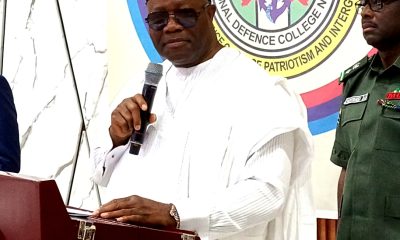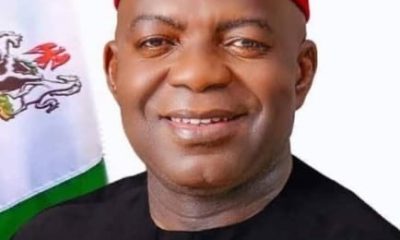EDITORIAL
National Defence College Graduates 2,549 Participants in 30 Years – Commandant

The Commandant, National Defence College (NDC), Rear Adm. Murtala Bashir, said the college has graduated no fewer than 2,549 participants from within and outside Nigeria in its 30 years of existence.
Bashir stated this while briefing newsmen on the college 30th Anniversary and Graduation of Course 30 Participants of NDC on Monday in Abuja.
The commandant was represented by the Deputy Commandant and Director of Studies, NDC, Maj.
-Gen. Emeka Anumajuru.He said that 216 of the participants were drawn from strategic Ministries, Departments and Agencies (MDAs); 92 from Nigerian Police and 254 international participants from allied nations.
According to him, among the participants were people who had reached the pinnacle of their career in the various services and MDAs.
The commandant said the college deemed it necessary to mark its 30th anniversary, having been able to record landmark success stories, especially in the remit of its mandate.
According to him, the college has the mandate to train selected senior military officers, their counterparts from strategic MDAs and the police to be able to operate at the strategic level within and outside the country.
“We insist our participants understand how to use the entire gamut of elements of national power to be able to achieve strategic objectives.
“That, in a nutshell, is the mandate of the college and that is what we strive to achieve since 1992 that the college was established.
Bashir said that NDC was a key arm of National Defence Diplomacy because of its level of interaction between the college and members of the armed forces from foreign countries.
He said the college could pride itself in advancing the nation’s defence diplomacy and ultimately the national foreign policy of Nigeria.
According to him, the college, too, is a centre of excellence in the conduct of peace support operations as a strategic level.
He added that NDC was a key partner in AU and ECOWAS in advancing peace support operations, particularly as regards the theoretical components that advance the missions at the strategic level.
The commandant also said that NDC could pride itself in corporate social responsibility in its host communities such as Ushafa in terms of provision of infrastructures, medical outreach, schools and even scholarship.
He said that series of programmes had been lined up for the 30th anniversary such as sports, humanitarian activities and award night as well as graduation lecture and graduation course 30 participants.
According to him, so many of the participants have been service chiefs in their armed forces.
“This year will be honouring two of them who are current service chiefs from Burkina Faso and Uganda.
“So, when you graduate participants who rise to the position of service chiefs in their respective countries, of course you have a link to those countries because we will monitor their progresses and they remain part of us. (NAN)
EDITORIAL
Ground Rent: Thumbs Up For FCT’s Bold Move Against Defaulters

In September 2023, the Minister of Federal Capital Territory, Nyesom Wike rattled Abuja land racketeers with an ultimatum asking them to develop plots of land alloted to them within two years or risk revocation. Most of those plots were in prime spots in the city centre and were alloted for not less than 20 years without any development.
Some plots were overgrown into forests with tall trees, becoming havens for undesirable elements. Ab initio, majority of those who acquired such lands had no plans for any development other than leaving them fallow for future profiteering and racketeering. The processes of acquiring complete title documents for those lands and annual payments of ground rent were observed in breach.The payment of ground rent is a legal requirement under the Land Use Act of 1978.The Act empowers the Governor of a state or the President, in the case of the Federal Capital Territory (FCT), to demand rental for any land granted to any person.The Consequences of non-payment or failure to pay ground rent can result in the imposition of penal rent, revision of penal rent, or outright revocation of the Certificate of Statutory Right of Occupancy.Wike, invoking relevant laws had continued to issue ultimatum with clear time lines to the allottees of undeveloped and fully developed plots of land on case by case basis from time to time to either develop such lands or pay up their ground rent indebtedness (up to date) to the FCT administration or risk revocation. Some allottees failed to heed those warnings.Another ultimatum was again issued three months ago, asking those yet to comply with earlier ones to pay up their indebtedness. Again, the warning went unheeded.Consequently, officials of the FCT administration on May 26, 2025, forcefully enforced the ultimatum by sealing properties of defaulters.High profile defaulters, amongst them; the People’s Democratic Party (PDP), Federal Inland Revenue Service (FIRS), Access Bank, et al, had their properties sealed.In a country, where corrupt proceeds are channeled into building of huge houses and sprawling estates, the FCT administration has taken the right steps to enforce the law on payment of ground rent.The sealing of such properties, preparatory to revoking their title documents is a signal to those corrupt individuals and corporate bodies that nobody – individual or corporate – is above the law.After all, the rent being charged on those properties are far in excess of the rightful rent tenants ought to pay.DAILY ASSET hereby commends Minister Nyesom Wike and his team for courageously invoking the law and applying appropriate sanctions against defaulters, no matter their status. This step has erased erroneous belief that some persons and corporate bodies are above the law.In the spirit of accountability, we ask the FCT administration to account for all proceeds and utilisation of the ground rent and other land fees collected.While applauding the FCT administration for the bold move, we caution against excessive or indiscriminate use of force in dealing with defaulters. Instead, dialogue and persuasion should be deployed for the good image of individuals and corporate bodies with their landlord the FCT.Most importantly, we urge the FCT to step out clean and clear the controversy from some corporate bodies, like the FIRS, PDP and a few individuals, insisting they are up to date in all land fee payments. And if their claims are found to be true, the FCT administration should be courageous enough to apologize to them to avoid the backlash of negative perception from the public against such bodies and individuals. Anything short of this might be judged as selective vindictiveness.EDITORIAL
Need to Urgently Redeem the Image of Nigeria’s Judiciary

The symbol of a blindfolded lady with a scale in one hand and a knife in the other depicts the balance and fairness the judiciary should represent in the society.This iconic symbol is meant to convey that justice should be administered without fear or favour, and that the law is applied equally to all and sundry, no matter whose ox is goored.
The blindfold signifies impartiality – that justice is blind to external influences, biases, or prejudices. It emphasizes Objectivity – that justice should be based solely on the facts and evidence presented before the court of law.The blindfold also represents fairness – that justice is fair and equal for all, regardless of social status, wealth, or other societal factors.It is the totality of all of these that the judiciary is aptly described as ‘the hope of a common man.’ However, there are discordant definitions of justice, being dished out by judicial officers in Nigeria today.Allegations of bribery, fraud, undue adjournments and delay of cases, favouritism in appointments and promotion of judicial officers, conflicting judgements of courts of coordinate jurisdiction or judgements that are at variance with earlier precedence, et al.One worrisome judicial spectacle is the conflicting judgements, especially from political cases before the courts. All of these have severely dented the image of Nigeria’s judiciary. Consequently, keen watchers make unsavoury remarks that justice has become a precious gift to only the ‘highest bidder,’ while others castigate certain judicial pronouncements as ‘jankara judgements.’ This should not be the case. A large dose and over-reliance on ‘technicalities’ by the courts rather than objectivity and substance of the case is another sore thump of the judiciary. Arguments bordering on technicalities in a case are sometimes escalated up to the apex court, thereby unduly delaying the hearing of the substantive case before the court.The appointment and promotion of judicial officers is another clog militating against transparency of justice delivery.Sections 231(3) of the Constitution of the Federal Republic of Nigeria (as amended) states; ‘A person shall not be qualified to hold the office of Chief Justice of the Supreme Court , unless he is qualified to practice as a legal practitioner in Nigeria and has been so qualified for a period of not less than fifteen years.’In same way, Sections 238(3), 239(3), 250(3) et al, states that a qualified legal practitioner with not less than twelve years and ten years are respectively qualified to be a Chief Judge of the Court of Appeal and Federal High Court, while ten years minimum qualification is stipulated for qualified legal practitioners to occupy the seat of the State High Court and the National Industrial Court in the other Sections that follow.The intent of the Constitution is that any qualified and competent legal practitioner from either the bench or the bar can be appointed as a judge in any court, including the Supreme Court. It is also the intent of the Constitution that the promotion of judicial officers to a higher court must not be sorely based on seniority in service. To reverse this, there have been pressures for appointment of qualified senior lawyers from the bar as Supreme Court judges and Court of Appeal to invigorate the judiciary to no avail. Thus, the old culture of ‘wait for your turn’ in the promotion of judicial officers whose thinking and actions are conditioned to the old order has continued to gain currency.DAILY ASSET urges the judiciary to immediately return to the constitutional provision as enshrined in Sections 231(3), 238(3), 250(3) et al, of the 1999 Constitution of the Federal Republic of Nigeria (as amended) to appoint qualified legal practitioners through a competitive process in order to inject a new dose of adjudication for the betterment of justice delivery. This will go a long way in rekindling and orientating the negative image of the judiciary in the country.Judges who will mount the saddle through this competitive process will be adequately armed with a new orientation that will usher in speedy dispensation of justice. It will also mark a departure from the ‘wait for your turn’ syndrome of promoting judicial officers on the bench based on seniority in service.The judiciary must do a critical introspection and reform both criminal and civil justice administration by timely attendance to cases in keeping to the axiom of ‘justice delayed is justice denied.’This is the sure way for the judiciary to redeem it’s badly battered image and restore hope and confidence by the public. ReplyForwardAdd reactionEDITORIAL
A Word Against Women Underrepresentation in Nigerian Politics

Women underrepresentation and marginalization in Nigeria’s political and democratic governance may not be reversed soon judging from the male chauvinism and non-adherence to the Beijing declaration more than two decades ago.Women comprise about 49.32 % of Nigeria’s population, yet they are relegated to the background politically, economically and in governance.
Historically, politics has been a male-dominated occupation but many countries in the world have long before now started encouraging women to actively participate in politics. Improving women’s political participation and representation should be prioritized by the political elite, currently dominated by men folk in Nigeria.Section 40 of the 1999 Constitution of Nigeria (as amended), guarantees the right to free assembly and association, including forming or joining political parties. However, women remain grossly underrepresented. The Beijing Declaration at the Fourth World Conference on Women in 1995, stipulates that 35% of political positions be reserved for women; unfortunately, this provision has been jettioned in Nigeria by the male-dominated political class. Efforts by various groups to enforce this 35% affirmative action have met a brick wall.In March 2022, the National Assembly rejected a bill requiring affirmative action for women in political party administration and specific legislative seats. Again, another bill proposing special seats for women in the national and state assemblies was also defeated.Factors such as religion, cultural norms, nepotism, socioeconomic barriers, political violence, illiteracy among women, and contradictory government policies impede women’s political representation. These issues hinder the full realization of 35% affirmative action in the country’s political space. Proponents of women participation in politics have continued to urge the government to demonstrate more commitment to women representation and participation in politics by endorsing, adapting and domesticating international and regional human rights instruments. Promoting affirmative action to build a critical mass of women in leadership roles and reviewing practices that marginalize women should henceforth be a priority in the nation’s political engineering.Those who belong to the school of thought that lowering the bar for women to participate in politics is counterproductive must have a rethink and pause to critically look at countries which have reserved at least 35% political representation and participation for women. Such countries are making tremendous progress in socio-political development.For instance, Rwanda sits atop Africa’s continent, nay the world, with a female majority in the National Assembly with 63.75% in House of Representatives and 53.75% in the Senate. Also, a number of countries whose presidents and or vice presidents are women no doubt, are making steady progress in all indices of development.The highest number of women ever elected into the National Assembly is thirty-six in 2007 with twenty-seven in the House of Representatives and nine in the Senate. Since then, there has been a steady decline to thirty-two in 2011, twenty-two in 2015 and eleven in 2019. It further declined to a paltry four women out of the 109 seats in the Senate in 2023, representing a meagre 2.7%, in spite of strategies to improve women’s political representation in Nigeria.The history of any nation cannot be complete without equitable contribution of women, which mostly go uncelebrated. Women play significant roles in our homes, offices and businesses and provide support systems leading to stability, productivity and profitability.However, governments at all levels through their policies, programmes, budgeting and service delivery processes over the years have failed to address the structural and social disadvantages that inhibit gender mainstreaming. This has placed women greatly at a disadvantage, leading to their exclusion.The private sector is not also left out from the marginalization of women. They have mostly remained reluctant to respond to deep disadvantages that cripple women eligibility to access funding, mainly in the areas of collateral and interest rates. Special consideration must be given to women, because with greater gender equality or rather equity in both public and private sectors, the benefits would be far-reaching especially in reducing poverty among other socio-economic gains. Globally, governments and gender advocates have over the years come up with resolutions to accelerate gender inclusion.Platforms like the Conference on Women, 1975, which was the first international conference held by the United Nations to focus solely on women’s issues, marked a turning point in policy directives. Another major significant step as earlier mentioned was the Beijing Conference in China that provided the framework to extend the frontiers for gender mainstreaming. Since then significant but sometimes inconsistent progress has been made in advancing gender inclusion. Many countries have continued to enact laws and formulate policies, but implementation remains the challenge.For instance, as with other critical sectors of the Nigerian economy, the enormous economic role played by women in the agricultural sector has remained barely supported and undervalued. In contrast to their male counterparts in agriculture, female participants in the sector have relatively narrow access to funding, inputs, training, extension services, land, technology, markets and decision making opportunities.Available reports have shown that female participants in the agriculture sector represent only 8% of landowners, access only 10% of available credit and 5% of extension services. This has restricted a large number of women at the level of subsistence farming, with the men dominating the commercial and lucrative aspect – largely exacerbating gender inequalities.Similarly, in politics women representation in terms of elective and appointive positions still leaves much to be desired.DAILY ASSET is of the opinion that the number of female ministers, commissioners and legislators at federal and state levels should be increased by a law duly passed by parliaments at national and sub-national levels and duly accented to by appropriate authorities. Through the acts of parliament, plans, policies, budget and service delivery become more gender sensitive to promote inclusion.Nigeria cannot make progress when half of the population is excluded from decision-making. Policy makers must keep to the axiom, ‘when you empower a woman you empower a nation.’
























